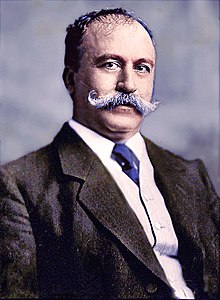Pedro Nel Ospina Vázquez
| Pedro Nel Ospina | |
|---|---|

Photograph of General Pedro Nel Ospina
|
|
| 11th President of Colombia | |
|
In office August 7, 1922 – August 7, 1926 |
|
| Preceded by | Jorge Holguín |
| Succeeded by | Miguel Abadía Méndez |
| 7th Governor of Antioquia | |
|
In office September 18, 1918 – April 12, 1920 |
|
| Preceded by | Pedro José Berrío |
| Succeeded by | Jesús María Marulanda |
| Personal details | |
| Born |
Pedro Nel Tomás de Villanueva Ospina Vázquez September 18, 1858 Bogotá, Antioquia State, Granadine Confederation |
| Died | July 1, 1927 (aged 68) Medellín, Antioquia, Colombia |
| Nationality | Colombian |
| Political party | Conservative |
| Spouse(s) | Carolina Vásquez Uribe |
| Relations | Mariano Ospina Rodríguez (father) |
| Children | Pedro Nel Ospina Vásquez, Luis Ospina Vásquez, Manuel Ospina Vásquez, and Elena Ospina Vásquez |
| Alma mater |
University of Antioquia, UC Berkeley, ENSCP |
| Occupation | Engineer, Businessman, Soldier, Professor, Rector and Politician |
| Profession | Engineer (Mining) |
| Religion | Roman Catholic |
| Military service | |
| Allegiance | Colombian Conservative Party |
| Service/branch | Army |
| Rank | General |
| Battles/wars |
War of the Schools, Thousand Days' War |
Pedro Nel Ignacio Tomás de Villanueva Ospina Vásquez (18 September 1858 – 1 July 1927) was a Colombian General and political figure. He served as president of Colombia between 1922 and 1926.
Ospina was born in Bogotá, on September 18, 1858. He was born in the Presidential Palace, as his father Mariano Ospina Rodríguez was president of Colombia at the time. He died in Medellín, on July 1, 1927.
Colombia's first significant effort in mining engineering was brought about by the Escuela Nacional de Minas in the city of Medellín. This institution was conceived strictly as a mining institute, modeled after the School of Mines of the University of California, Berkeley, from which its first directors, Ospina and his brother Tulio Ospina were graduated. When the school began its second life after 1904, it also offered degrees in chemistry, civil, electrical, mining and mechanical engineering. As rectors of the school, echoing the themes of their father, they insistently preached the virtues of work, discipline and practicality.
Antioqueño engineers thought of themselves primarily as industrial entrepreneurs rather than agents of state policy. Although some, such as Ospina and his nephew Mariano Ospina Pérez, became highly successful in national politics, antioqueño engineers continued to nurture the self-image of the apolitical, economically practical, hardworking paisa. Since 1910, successful businessmen and engineers emerged from the business community of Medellín, as did Ospina, who was a Berkeley-trained mining engineer and an industrial entrepreneur as well as a large-scale agriculturalist.
Ospina was elected MP to the Camara de Representantes (House of Representatives) in 1892 and 1894 for the province of Antioquia. During his first term he sponsored the bill to derogate the “Ley de los Caballos” and introduced a bill to enact the “freedom of speech”. During his second term he sponsored a bill to restructure the Banco Nacional (National Bank).
Ospina was a General of the Army during the civil war of the Thousand Days' War. In 1901 he was appointed as Minister of War by President José Manuel Marroquín.
...
Wikipedia
